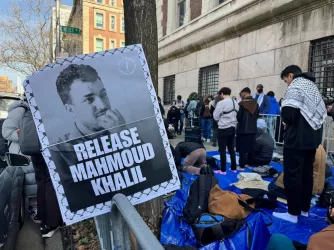Table of Contents
The Media Has Never Understood the Oxy Case
So, sadly and predictably, the coverage of the Oxy settlement has entirely missed why the Oxy case was so egregious. While some of the articles that have been written mention Jason Antebi’s rude on-air speech, they ignore the most serious facts of the case. As I said in the press release, the case was not so much about speech as it was about ruthlessness, corruption, and violations of students’ rights in a post hoc effort by a college to prove it had done the right thing. As loyal Torch readers might remember, I did a 10-part blog series on the Oxy case, explaining what was wrong with Occidental’s handling of the case. Reprinted below is an excerpt from the conclusion of that series explaining why we think the case is so important:
1. Oxy found a student guilty of violating federal harassment law for on-air jokes and insults—a redefinition of harassment law that is representative of a disturbing shift in California’s ability to distinguish between unprotected harassment and free speech. Oxy did so despite a letter from FIRE and the ACLU of Southern California that indicated that his jokes did not constitute “harassment” of any kind and despite clear guidance from a federal agency that harassment is a pattern of behavior much more serious than crude insults. One student alleged she was called a “bearded feminist” and a male student alleged he was called a nickname that used the word “douche”—both are the sort of sophomoric insults that are extremely common on college radio and neither constitute harassment “on the basis of sex” as required by sexual harassment law. Oxy also punished Antebi despite the fact that Oxy is bound by California’s Leonard Law, which grants students at private colleges the full free speech rights enjoyed by students at state universities under both the First Amendment and the California constitution. The factually similar Supreme Court case Papish v. Board of Curators of University of Missouri, 410 U.S. 667 (1973), stated that “the mere dissemination of ideas—no matter how offensive to good taste—on a state university campus may not be shut off in the name alone of ‘conventions of decency.’”
2. Most outrageously, Oxy’s general counsel Sandra Cooper responded to attempts by FIRE and the ACLU to intervene on behalf of Antebi’s free speech with a series of allegations ranging from vandalism to racial discrimination. Many of these allegations were easily proven false and some of the most serious allegations were apparently so baseless that Oxy never even charged Antebi with those offenses even within the student judiciary. While it is impossible to recount all of the blatant misrepresentations in Sandra Cooper’s response in a short format (it took us a 28-page letter to do so) one of the more interesting misrepresentations was Cooper’s claim that Antebi created a segment on his radio show called “Token Black Girls” to mock two African Americans fired from their positions by the student government. Not only do we have an email from the student who hosted and named this segment (an African-American girl who apparently used the name to mock tokenism), but the segment also appeared almost a month before the firing took place. The most basic research into the facts of this case would have revealed that these allegations were not true, which led FIRE to conclude:
Occidental’s legal errors and factual misrepresentations were so gross that they are either intentional or are part of an unlikely series of extraordinary errors that coincidentally supported the college’s claim that it has engaged in no wrongdoing in its behavior towards Antebi.
And:
If (as appears likely) these false statements were intentional, then this series of factual misrepresentations, baseless accusations, and legal distortions were likely an attempt to deter groups like FIRE and the ACLU from aiding Antebi in this case.
3. Oxy used the incident with Jason Antebi as an excuse to dissolve the entire student government—a virtually unprecedented step in my experience.
4. The case is part of an ongoing and serious war against biting parody and satire that has serious implications for freedom of speech and freedom of the press.
5. The college allowed and continues to allow students to use campus regulations as means to stifle debate and dissent, often for obviously political ends.
6. In its efforts to justify Oxy’s actions, Cooper publicly insulted the ACLU of Southern California, by saying, essentially, that no matter what the ACLU of Southern California says, Oxy censorship was actually in line with ACLU policy! Of course, ACLU Vice President Michael Meyers rejected this remarkable and arrogant claim as did Ramona Ripston, the executive director of the ACLU of Southern California. Oxy does not, in fact, understand ACLU policy better than the ACLU.
7. Despite being directly informed of wrongdoing, including serious legal and ethical violations, on the part of Oxy employees, the Board of Trustees and Oxy President Ted Mitchell have taken no apparent action against the Oxy personnel responsible.
Then as now, the media, especially the LA Times, did not get it. As I wrote in 2005:
This case might have been resolved last year if it had not been for the lousy and deferential coverage by the Los Angeles Times. Fortunately, the case has been covered by other media, including the Pasadena Star News and Oxy’s own student media, which have done a more thorough job of covering the case. The Collegiate Network has also greatly helped draw important attention to the case by including Occidental in its 2005 Campus Outrage Awards.
The good news: Jason is happy with his settlement, and the Oxy case is now one for the history books. But Occidental should still be ashamed of itself.
Recent Articles
FIRE’s award-winning Newsdesk covers the free speech news you need to stay informed.

VICTORY: Federal court blocks Texas A&M’s unconstitutional drag ban

Columbia caves to feds — and sets a dangerous precedent

American Jews must not give an inch on free speech — even when words hurt us
